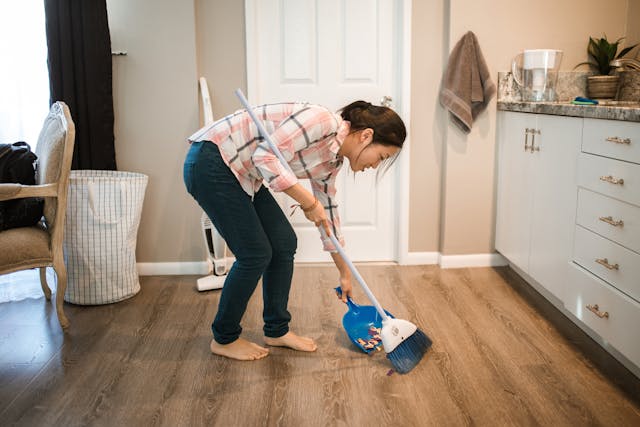As a landlord, managing maintenance requests effectively is crucial to keeping your rental property in excellent condition and maintaining a positive relationship with your residents. However, not all maintenance issues require immediate action.
As a landlord, managing maintenance requests effectively is crucial to keeping your rental property in excellent condition and maintaining a positive relationship with your residents. In fact, the number one reason tenants choose not to renew their leases is poor maintenance response times.
However, not all maintenance issues require immediate action. Understanding the difference between emergency and non-emergency repairs helps landlords prioritize urgent matters while handling routine requests efficiently.
A well-structured maintenance process ensures faster response times, reduced costs, and higher tenant satisfaction, ultimately leading to stronger lease retention and a more profitable investment.
This is why companies that employ a vertical integration strategy, like Stonelink Property Management, is the future of maintenance. With us, all of your essential services are provided by one amazing team, cutting out the need for third-party contractors to fix your plumbing or mount your TV.
Knowing which situations demand urgent attention and which can wait until regular business hours is essential for both saving costs and ensuring the safety and comfort of your residents.
Below, we’ll explore common maintenance issues, identify which ones are emergencies, and provide tips on handling these situations efficiently.
Defining an Emergency Maintenance Issue
An emergency maintenance issue is any problem that poses an immediate threat to the safety, health, or well-being of your residents or causes significant damage to the property if left unaddressed. Examples include:
- Flooding or Major Water Leaks: Burst pipes or severe plumbing issues that result in water damage.
- No Heat in Freezing Weather: Malfunctioning heating systems during cold seasons.
- Electrical Hazards: Exposed wires, electrical outages, or sparking outlets.
- Gas Leaks: Any indication of a gas leak, such as a strong smell of gas.
- Fire: Active fires or residual smoke damage that impacts the livability of the unit.
- Sewage Backups: Overflowing toilets or backed-up sewer lines causing unsanitary conditions.
- Broken Windows or Doors: Issues that compromise the security of the property.
These issues require immediate attention to mitigate risks to residents and property. Ignoring them can lead to costly damages, potential legal liabilities, and unhappy residents.
Non-Emergency Maintenance Issues
Non-emergency issues are those that, while inconvenient, do not pose an immediate danger or cause significant damage. These can typically wait until regular business hours.

Common examples include:
- Leaky Faucets or Slow Drains: Minor plumbing issues that do not result in water damage.
- Cosmetic Damage: Peeling paint, small holes in walls, or worn carpets.
- Broken Appliances: Malfunctioning dishwashers, washing machines, or other non-critical appliances.
- HVAC Issues: Problems with air conditioning or heating systems that do not affect health or safety.
- Pest Problems: Non-severe pest issues, such as ants or spiders, unless it’s a widespread infestation.
Addressing these issues promptly during business hours shows your residents that you value their comfort while allowing you to prioritize urgent matters.
PRO-TIP: Use a color-coded system to categorize maintenance requests based on urgency. Emergencies should be flagged red for immediate action, while non-urgent issues can be marked yellow or green to ensure efficient response without overloading emergency resources.
At Stonelink Property Management, we leverage Property Meld, the leading property maintenance software, to streamline repairs, improve efficiency, and lower maintenance costs. This system helps us prioritize critical repairs while keeping routine maintenance organized and cost-effective

When an emergency arises, follow these steps to address the situation effectively:
- Respond Quickly: Acknowledge the resident’s concern immediately and assure them that action will be taken promptly.
- Assess the Severity: Gather details about the issue to determine its urgency. Photos or videos can be helpful.
- Contact the Appropriate Professionals: Reach out to trusted contractors or emergency repair services. No matter how well you maintain a property, maintenance issues are inevitable, it’s not a matter of if they will happen, but when.
The best way to avoid delays and costly damage is to plan ahead. Have trusted vendors and service providers lined up in advance so when an issue arises, you’re ready to act—without scrambling for solutions. - Communicate Updates: Keep the resident informed about the progress and estimated resolution time.
- Document the Issue: Maintain records of the incident, including photos, repair receipts, and communication logs.
Strategies for Managing Non-Emergency Issues
Efficiently handling non-urgent maintenance requests involves:

- Setting Clear Expectations: Inform residents of your standard response times for non-emergency repairs.
- Prioritizing Requests: Address issues in order of severity and impact.
- Scheduling Regular Inspections: Proactive maintenance can prevent minor problems from escalating into emergencies.
- Maintaining Good Communication: Let residents know when their concerns will be addressed to build trust and satisfaction by communicating well with tenants.
Importance of Educating Residents on Maintenance
Educating your residents about what constitutes an emergency versus a non-emergency can significantly improve the efficiency of your maintenance process.
Make sure to provide them with a clear list of examples and a guide on how to report issues so they understand when immediate action is necessary. Include details about how to shut off utilities, like water or gas, in case of emergencies to prevent further damage before help arrives.
It's crucial to encourage open communication as this fosters trust and helps residents feel supported, which can lead to fewer unnecessary emergency calls and a smoother management experience overall.
Taking this proactive step also reflects your professionalism and commitment to maintaining a safe, comfortable living environment for your residents.
The Benefits of Hiring a Professional Property Management Company
Managing maintenance issues, both urgent and non-urgent, can be overwhelming, especially for landlords with multiple properties or other commitments. This is where a professional property management company can make a significant difference.
Advantages of Working with a Property Management Company:
- 24/7 Emergency Support: Professional property managers have systems in place to handle emergency maintenance issues around the clock. This ensures that critical situations are addressed promptly, even during weekends or holidays.
- Access to Reliable Contractors: Property management companies often have established relationships with skilled contractors and vendors. This means faster response times and quality repairs at competitive rates.

- Proactive Maintenance: Routine inspections and maintenance schedules are implemented to identify and resolve potential problems before they escalate.
- Effective Communication: Property managers act as a liaison between landlords and residents, ensuring clear communication and prompt updates on maintenance issues.
- Cost Savings: By efficiently managing repairs and leveraging their network of vendors, property management companies can save landlords time and money.
- Legal Compliance: Experienced property managers ensure that maintenance practices comply with local laws and regulations, reducing liability risks for landlords.
How to Choose the Right Property Management Company
When selecting a property management company, consider the following factors:
- Experience and Expertise: Look for a company with a proven track record in managing properties similar to yours.
- Availability: Ensure they offer 24/7 support for emergency maintenance issues.
- Reputation: Read reviews and ask for references from other landlords.
- Transparency: Choose a company that provides clear communication and detailed reports about maintenance activities.
- Cost: Compare fees and ensure the services offered align with your budget.
The Stonelink Advantage: Our Vertical Integration Strategy
Unlike most property management companies that rely on third-party contractors, we’ve built in-house divisions for essential maintenance services.
- Stonelink Plumbing: Licensed plumbers handle everything from leaks to water heater replacements.
- Traprock Landscaping: Full-service landscaping, snow removal, and exterior upkeep.
- Dedicated Maintenance Team: Ensuring faster response times and quality control.
By owning our service teams, we eliminate delays and inconsistencies, providing our clients with faster, more affordable, and higher-quality maintenance solutions.
With Stonelink, you get more than just property management, you get a fully integrated solution that keeps your investments in top shape while providing residents with the service they deserve.
Bottom Line
Understanding the difference between emergency and non-emergency maintenance issues is vital for effective property management. Emergencies such as gas leaks, flooding, or fire require immediate attention to protect your residents and property.
On the other hand, non-urgent issues can be addressed during regular business hours, allowing you to prioritize resources efficiently.
Hiring a professional property management company can help landlords navigate these challenges with ease. From 24/7 emergency support to cost-effective solutions, property managers ensure that your investment remains secure and your residents are satisfied.
By partnering with experts, you can focus on growing your portfolio while they handle the complexities of maintenance and resident relations. Invest in professional property management with Stonelink Property Management today to provide exceptional care for your property and residents alike.


